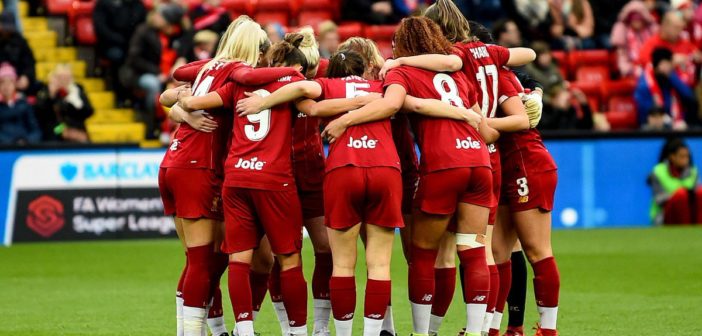Liverpool have not had a good season. The team, with their flaws laid bare, have toiled both publicly and privately. As their male counterparts dived head first into their league season [off of the back of their first Champions League title in almost a decade and a half], the women’s team began to spiral downwards. One loss became two, then three.
The squad was a thin one that could do little to cope with their routine injuries – a fact not helped by the lack of a strength and conditioning coach for a significant portion of the season. The resources Vicky Jepson had to work with were laughably poor for a so-called professional club, the coach promoted to her first managerial role staunchly refusing to be drawn in and show negativity. There was always a positive to be found in each match, still smiling through defeat, the Reds’ boss wholly accepting of the task on her hands and additional workload thrust upon her.
Divergent Reds
The football brought little success, the young manager’s head was called for, but on the pitch the team were faring better than some might suggest. The Reds, unfancied on paper, found a resolution on the turf and, of their ten league losses only three have been by more than one goal. The side had a dogged determination to it, so far removed from Jürgen Klopp’s dream team has continued to blow teams out of the water in the Premier League.
Jepson’s team, although respectable enough over 90 minutes couldn’t hit the side of a barn with a pregnant cow: a significant problem. Scoring just three goals in their first 11 matches of the league season, things were looking grim for Liverpool and although boosted by the signing of Rachel Furness, the team couldn’t wrench themselves from the foot of the table.
And then the Coronavirus brought football to a standstill, leaving Liverpool sat on the floor of the WSL table – a spot they’ve be warming for the majority of the season – but what of their fate? If The FA still opt to relegate a team from the top tier this season, there is no calculation that can save the Reds.
Time to yell, “Timber”
So, the question becomes, do they deserve to be saved? On straight points, points per match, number of losses or number of wins, all signs point to relegation (only on goal scored are Liverpool not dead last). But the twice champions wear a crest familiar to football fans the world over, the proud red liver bird at times their only tenuous link to the men’s team.
As Manchester United manager, Casey Stoney said earlier in the year, “Liverpool football club is a massive name so for the women’s game, we kind of need them to stay up.”
So that is what we’re left with; a brand, a name. A club that helped ease women’s football onto its current path in England, but one that all too soon, grew apathetic and let their women’s side stagnant. I say this not out of malice (I am after all, a Norwich City fan that has accepted the fate of the men’s team) but Liverpool have no given right to play in the Women’s Super League. No team does, and any team that suffers the type of season that Liverpool Women have, has to accept the consequences.
Might be the jolt the club’s hierarchy need to invest properly
— Glenn Moore (@GlennMoore7) May 19, 2020
Liverpool FC will vehemently tell you that they respect their women’s team and will show you records that highlight increased investment in the team but the official statements from the club echo hollow. “One badge, one club” has become a tasty PR morsel rather than a heartfelt ethos, the proof rippled through the last handful of seasons that have seen the team slip from the head of the pack to wheezing straggler.
If the argument is that Liverpool deserve a spot in the top flight because they share a name of a prominent men’s team, something has gone terribly wrong somewhere.
![Prost International [PINT]](https://prostinternational.com/wp-content/uploads/2021/08/PINTtFontLogoRoboto1536x78.jpg)



